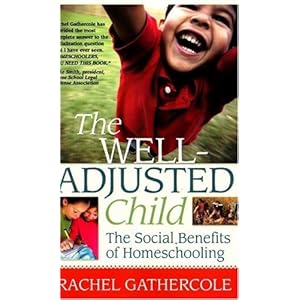Elaine at Our Crazy Life recommended this book to me and I am so grateful that she did!
Making the decision to homeschool was difficult, not because I am worried that I can't give my girls a good education, but because I worried about them socially. I worried about all of the rites of passage that they would miss: the prom, the football games, boyfriends, being cool, finding your place.... This book looks at each of these areas and more and then offers observations by homeschooled kids, homeschool parents and traditional school kids.
This book definitely made me feel that while my girls' experience will be different, it will be positive.
While homeschooled children may miss out on the football games and the prom, they also miss out on the less desirable aspects of school--the teasing, the bullying, the being left out. Homeschooled kids are more likely to have "real" friendships and to have the time to develop healthy, supportive friendships.
This book points out that the definition for what is "cool" is very subjective. Homeschooled kids come up with their own definition of "cool"--trend setters are cool, people who do their own thing are cool, people who think outside the box are cool; traditionally schooled kids label the kids who fit in best, who tease others, who bully and who act like and dress like everyone else as cool.
Homeschooled kids don't pay attention to the labels on clothing, the "right" parties and having the latest and greatest, they are more likely to like other kids because the other kids are nice. They are less likely to feel bad about themselves for not having the right clothes or shoes or hairstyle or boots or cell phone. They are much more likely to think for themselves and to do what is best for them.
Homeschooled kids have never learned that adults are the enemy. Homeschooled kids are more likely to respect adults, value their opinions and be able to comfortably communicate with adults.
As far as preparation for the real world, I don't think anyone could argue that kids who can communicate with adults, think for themselves and determine friendships not by artificial, materialistic means, but by whether or not someone is nice, are better prepared for the real world than those who are uncomfortable with adults, always follow the crowd and have friends based on their clothing and cars. Sure, our society seems to be more concerned with material things, image and status...but no one could argue that someone who thinks for themself won't be well off.
This quote from Madonna was in the book and I love it:
"When you're your own person and not so concerned with impressing, then the other person is very impressed." ~ Madonna
